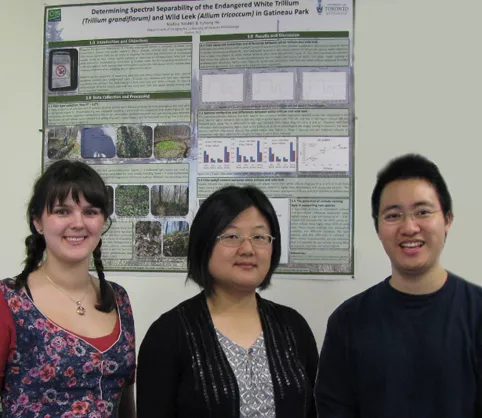A Week in the Park

Professor Yuhong He from the Department of Geography at U of T Mississauga has a great appreciation for the fruitful outcomes of the Research Opportunity Program (ROP), which, in her opinion, benefit faculty as well as the students.
For the past two summers, He and her PhD student Amy Mui took two ROP students, Alexander Tong and Nadine Nesbitt, to Gatineau Park, Quebec, where they employed remote-sensing technology to map the distribution of endangered vegetative species called Wild Leek and White Trillium. He and the students spent a full week at the site collecting field data. Back at UTM, they processed the field data, and linked the field data to satellite imagery using remote sensing and geographic information systems (GIS) techniques. The endangered species were then accurately mapped throughout the whole park.
“This is the beauty of remote-sensing science,” says He. “While the endangered species may be directly observed in the field, remote sensing with its synoptic overview allows independent, fast, up-to-date, and cost-effective mapping of the species for a relatively large geographical area.”
With funding from the Park and internal U of T sources to enable this excursion, He, Mui, Tong and Nesbitt braved the cold wind and mosquitoes while trekking through the site, carrying a few pieces of equipment for at least ten hours per day during the week at Gatineau Park. When they arrived back at their hotel, they spent another few hours analyzing the data they collected.
“The field and lab work was quite intensive for the two ROP students, but I think they learned the basic process for conducting remote-sensing research, and found the work associated with research is so different from taking courses,” says He. “For research you have to take initiative, work independently and think independently. This ROP program provided me with a great opportunity to identify and attract the best possible research students to my group. Tong and Nesbitt are genuinely interested in academia and environmental remote-sensing research after being in the ROP program, and they will start their new research journey in the coming September as Master’s students in the Geography Department at the University of Toronto”
He will continue to hire more ROP students each year so they can “see what research looks like in an application oriented project.” He personally enjoys the ROP program because it “combines teaching and research together.”
Gatineau Park has asked He to complete two projects in a row that involves mapping endangered species in the park using remote sensing technology. “I see this an indication that they love our work!” says He.



